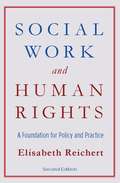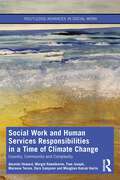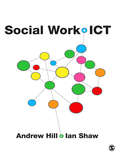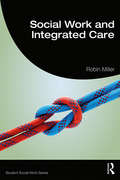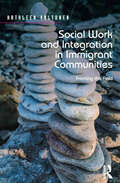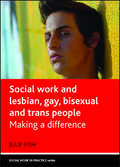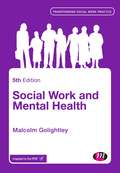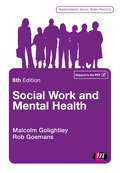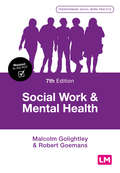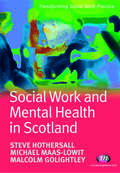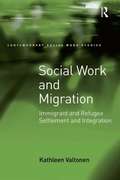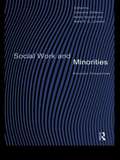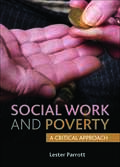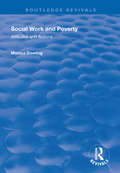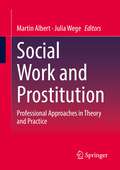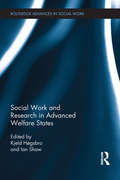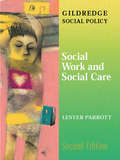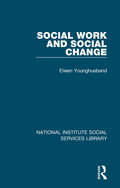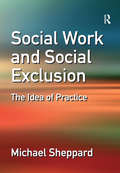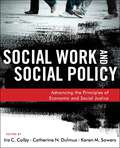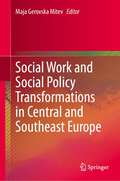- Table View
- List View
Social Work and Human Rights: A Foundation for Policy and Practice
by Elisabeth ReichertSocial Work and Human Rights has become a standard text highlighting the role of social work in protecting the rights of vulnerable populations. Through rigorous analysis, classroom exercises, and a frank discussion of the implications for practice both within and outside of the United States, the volume effectively acquaints readers with the political, economic, and social dimensions of rights issues and the documents that guarantee them. New material covers international events, such as the United Nations' Millennium Declaration (2000) and its effort to reduce the poverty and suffering of billions worldwide. The volume now emphasizes cultural rights and includes a probing lesson in cultural relativism. It turns a critical eye toward the failure in the United States to address social welfare issues and its reluctance to rectify policies favoring one group over another.
Social Work and Human Services Responsibilities in a Time of Climate Change: Country, Community and Complexity (Routledge Advances in Social Work)
by Amanda Howard Margot Rawsthorne Pam Joseph Mareese Terare Dara Sampson Meaghan Katrak HarrisThis book provides an accessible, research-informed text for students, social workers and other social service workers and community development workers focused on practically linking climate change to social justice. The book is designed for: • Those who want to embed an understanding of climate change and its social justice impacts in their everyday practice. • Those keen to explore the explicit but also often invisible ways we see injustice playing out and exacerbated by climate change. • Those interested in embarking on research and action which addresses climate change in an inclusive, creative and fair way. Utilising existing and current research with organisations, government and communities, it examines key themes and contexts where work has been done and where more work is needed to design and implement inclusive and just action on climate change. With a core position revolving around the idea and practice of justice – for earth and everything that lives here, it draws on First Nations worldviews, critical analysis, community-led approaches and complexity theory, to outline some practical ways to adapt to and mitigate the impacts of climate change as well as a strategy to reshape our life and work for the longer term. It will be required reading for all scholars, students and professionals of social work, social welfare, community development, international development, community health and environmental and community education.
Social Work and ICT
by Ian Shaw Andrew HillInformation and Communication Technologies (ICTs) have become an integral part of social and working lives. Within social work ICTs play a vital role, helping professionals to store and share information and contributing to new forms of practice. This book goes a step further than simply describing ICT skills, but asks why ICT is used and how this affects practice and the experience of people who use services. The book has a practical focus and includes guidance on: Best Practice for Social Work and ICT ICT Use in Social Work Service Users, Carers and ICT Technology and Professional Practice ICT and Social Work Agencies Social Work Programmes in the Virtual World ICT and Practice Based Learning Written in a student-friendly style, Social Work and ICT is interspersed with activities and exercises to enable students to develop their skills and knowledge. Each chapter also includes a ′Taking it Further′ section with useful websites, suggestions for further reading and ideas to improve practice. The book has been designed to enhance professional practice and it will be essential reading for all undergraduate programmes in social work.
Social Work and Integrated Care (Student Social Work)
by Robin MillerSocial Work and Integrated Care draws on the latest research, practice and theory to explore integration within both child and adult services. Although all the home nations in the UK view integrated care as a top priority within health and social care policy, many people continue to experience fragmented care. This book sets out the case for integration, considers the evidence of its impact, and discusses the implementation challenges that must be overcome. Packed full of current examples of integration, from across the UK and internationally, and reflexive exercises which highlight practice issues for social workers, it provides the following key learning outcomes: • An understanding of what is meant by integrated care and why it is seen as vital to a modern health and social system. • A knowledge of the expected impacts in relation to improving the experience and outcomes for individuals and their families, addressing inequalities and promoting health and wellbeing and increasing financial efficiency. • A recognition of the common barriers to integrated care and what such fragmentation can mean for individuals and their families. • A critical review of key approaches to promote integration and their practical implementation. • Reflection on the potential contribution of social workers and their own collaborative practice. Providing a comprehensive and accessible overview of integrated care policies and practice, this book will help prepare social workers for the realities of collaborating with other professions and services. It should be considered essential reading for students undertaking their professional qualification and those who are in practice who are looking to improve their ability to collaborate.
Social Work and Integration in Immigrant Communities: Framing the Field
by Kathleen ValtonenThere has been a marked rise in global migration with many former countries of emigration becoming immigration destinations. As a result of this, social workers increasingly encounter immigrant clients and are called upon to work in their communities. At the same time, in the field of research, theories, conceptual frames, perspectives and discourse have materialized and evolved to make sense of contemporary events. Social work professionals, researchers and students must, therefore, need to be apprised of current thinking, research and discourse in the field of integration. Valtonen familiarizes the reader with the variation in national policies, institutional arrangements and service responses, which all provide rich contrasts and insights into a breadth of policy possibilities. Since macro-level developments in migration carry direct implications for social work as a discipline and a profession with a central stake and role in immigrant wellbeing, this book provides salient information to help with visioning in the profession, defining appropriate and concerted responses, and building robust standing in the field as well as promoting the linking of disciplinary and multidisciplinary research with practice.
Social Work and Intimate Partner Violence
by Mary AllenIntimate partner violence is now recognised as a serious human rights abuse and increasingly as an important public health problem with severe consequences for women’s physical, mental and sexual health. Therefore, a comprehensive understanding of intimate partner violence is an essential aspect of good-quality social work practice. This is an accessible introduction to the complexities of social work practice with abused women, as well as men. Designed for those new to practice in this area, it outlines and explores some of the key issues from an international perspective, such as the role and responsibilities of a social worker, prevalence rates and research around causes and consequences. It includes chapters on working with women with additional vulnerabilities, working with perpetrators, impacts on physical and mental health, child protection issues, assessment and intervention strategies, and long-term approaches. Social Work and Intimate Partner Violence is an up-to-date book bringing together all the most important information in the area for social workers, and is essential reading for all students and newly qualified professionals.
Social Work and Lesbian, Gay, Bisexual and Trans People: Making a Difference (Social Work in Practice series)
by Julie FishThis important textbook makes a timely contribution to international agendas in social work with lesbian, gay, bisexual and trans (LGBT) people. It examines how practitioners and student social workers can provide appropriate care across the lifespan (including work with children and families and older people) and considers key challenges in social work practice, for example asylum, mental health, and substance misuse. Drawing on practice scenarios, the book takes an enquiry-based learning approach to facilitate critical reflection. Its distinctive approach includes: • use of the concepts of the Professional Capabilities Framework for social work • key theoretical perspectives including human rights • structuring of the text around the framework of the UK National Occupational Standards for Social Work • student-friendly features including key questions and exercises • a complete glossary of key terms and concepts • examination of the UK policy and legislative context It is informed by international research in social work with LGBT people The book is essential reading for students on qualifying social work programmes and practitioners in statutory, voluntary and independent sectors.
Social Work and Mental Health
by Malcolm GolightleyThis new edition provides a thorough grounding in the key issues in mental health. It highlights the key issues in this complex and sensitive area of practice and helps students to understand the latest policy and practice issues. The book looks at various aspects of Mental Health Law including the Mental Capacity Act 2005 and the recent amendments to the 1983 Mental Health Act. The author is careful to apply these laws to everyday practice in an accessible and user-friendly way. This new edition includes updates to key policy areas such as Putting People First (2007) and No Voice (2007).
Social Work and Mental Health
by Malcolm GolightleyThis third edition provides a thorough grounding in the key issues in mental health and, by highlighting the skills and values that are necessary for contemporary practice, helps students to develop their knowledge and understanding to enable them to deliver an appropriate and responsive service for people facing mental health challenges. This edition also reflects the recent and important changes to mental health legislation policies and practice, including the implementation of the Mental Capacity Act 2005 and the Mental Health Act 2007, which makes significant amendments to the 1983 MHA, including the introduction of the Approved Mental Health Professional.
Social Work and Mental Health (Transforming Social Work Practice Series)
by Professor Malcolm Golightley Robert GoemansWith 1 in 4 people experiencing a mental health problem in any given year, mental health is a more important part of social work training than ever before, and all successful social workers need to understand the core values, skills and knowledge that underpin excellent practice in a modern mental health system. Written as an accessible introduction to the complex issues around mental health, this book has become a classic in its field. Law and policy are clearly outlined while the authors give space to important ethical considerations when working with the most vulnerable in society. There are clear links between policy, legislation and real life practice as well as a wealth of learning features.
Social Work and Mental Health (Transforming Social Work Practice Series)
by Robert Goemans Professor Malcolm GolightleyWith 1 in 4 people experiencing a mental health problem in any given year, mental health is a more important part of social work training than ever before, and all successful social workers need to understand the core values, skills and knowledge that underpin excellent practice in a modern mental health system. Written as an accessible introduction to the complex issues around mental health, this book has become a classic in its field. Law and policy are clearly outlined while the authors give space to important ethical considerations when working with the most vulnerable in society. There are clear links between policy, legislation and real life practice as well as a wealth of learning features.
Social Work and Mental Health (Transforming Social Work Practice Series)
by Robert Goemans Professor Malcolm GolightleyWith 1 in 4 people experiencing a mental health problem in any given year, mental health is a more important part of social work training than ever before, and all successful social workers need to understand the core values, skills and knowledge that underpin excellent practice in a modern mental health system. Written as an accessible introduction to the complex issues around mental health, this book has become a classic in its field. Law and policy are clearly outlined while the authors give space to important ethical considerations when working with the most vulnerable in society. There are clear links between policy, legislation and real life practice as well as a wealth of learning features.
Social Work and Mental Health in Scotland (Transforming Social Work Practice Series)
by Malcolm Golightley Steve Hothersall Mike Maas-LowitSince the inception of the Scottish Parliament in 1999, mental health law, policy, practice and ethos have changed dramatically in Scotland. This book provides a thorough grounding in the key issues in mental health and presents a clear picture of the current Scottish mental health scene. By highlighting the skills and values that are necessary for contemporary practice, it helps students to develop their knowledge and understanding to enable them to deliver an appropriate and responsive service for people facing mental health challenges.
Social Work and Migration: Immigrant and Refugee Settlement and Integration (Contemporary Social Work Studies)
by Kathleen ValtonenSocial work increasingly finds itself at the frontline of issues pertaining to immigrant and refugee settlement and integration. In this timely book, Kathleen Valtonen provides the first book-length study on the challenges these issues create for the profession. Drawing on a wide range of research in migration which is not widely available to social workers or included in social work literature, she offers readers an opportunity to explore the capacity of the profession to take a primary role in the course and outcome of settlement. The book fills a gap in the social work literature by providing scholars, practitioners and students with a critical knowledge base that will strengthen their ability to engage with issues of immigration and integration and to open up options for effective practice with growing numbers of immigrant and refugee clients.
Social Work and Minorities: European Perspectives
by Charlotte Williams R.D. Johnson Mark Haluk SoydanSocial Work and Minorities examines the new challenges presented to Social Workers throughout Europe by the complex problems occasioned by increased migration and settlement and the growing awareness of the specific needs of refugees and asylum seekers. Contributors use illustrative examples from throughout Europe to examine key concepts such as: globalization, assimilation, visibility, multi-culturalism, racism, marginalization and social exclusion. Social Work and Minorities will be an essential resource for social work students, practitioners and educators working with migrant communities throughout Europe.
Social Work and Poverty: A Critical Approach
by Lester ParrottSocial work and poverty: A critical approach provides a timely review of the key issues facing social workers and service users in working together to combat poverty.First, it situates social work and poverty within a historical context, then analyses definitions and theories of poverty along with their importance in enabling anti-oppressive practice with service users. It goes on to evaluate the Welfare Reform Act 2012 in relation to the negative impact on service users and social workers alike. Key areas of social work and social care are covered with regard to the effects of poverty including, uniquely, access to food, obesity and problematic drug use. Finally the impacts of globalisation on social work and issues of poverty are explored. The book will be of interest to students, researchers and academics in social work and policy makers working in related areas.
Social Work and Poverty: Attitudes and Actions (Routledge Revivals)
by Monica DowlingFirst published in 1999, this much-needed volume powerfully re-evaluates attitudes to the ‘deserving and ‘undeserving’ poor and aims to investigate social workers’ attitudes and actions towards poverty issues, social service users who have needed financial help and to question whether learning about poverty is an integrated part of social work students’ training and social workers’ in-service training. Monica Dowling has experience of being a social work student and social worker, as well as a social work teacher and researcher. In an age when increasing numbers of undergraduate and postgraduate students are unemployed and living on benefits, Dowling reveals the true picture of the people who end up on the poverty line, reconnecting social work theory and practice.
Social Work and Prostitution: Professional Approaches in Theory and Practice
by Martin Albert Julia WegeProstitution is a taboo fringe area of society, about which there is hardly any well-founded information and scientific knowledge. Women who work in prostitution have to struggle with social prejudices, social discrimination and legal disadvantages and therefore need specific counseling and low-threshold services. Social work has a long tradition of helping this target group on a case-by-case basis and advocates for the rights and dignity of women. From the perspective of professional social work, this volume provides an overview of the complexity of the field of prostitution and presents theoretical and methodological approaches.This book is a translation of the original German 1st edition Soziale Arbeit und Prostitution by Martin Albert and Julia Wege, published by Springer Fachmedien Wiesbaden GmbH, part of Springer Nature in 2015. The translation was done with the help of artificial intelligence (machine translation by the service DeepL.com). A subsequent human revision was done primarily in terms of content, so that the book will read stylistically differently from a conventional translation. Springer Nature works continuously to further the development of tools for the production of books and on the related technologies to support the authors.
Social Work and Research in Advanced Welfare States (Routledge Advances in Social Work)
by Kjeld Høgsbro and Ian ShawThe aim of this book is to exemplify the ways in which social work and research develop in ‘advanced’ welfare states – countries where public spending is relatively high as a proportion of GNP. While such countries have traditionally been associated with Scandinavian countries in particular, and North-Western Europe more generally, there are other countries where the public spend on welfare is relatively high. The various contributors in this book explore and exemplify ways in which social work and research are distinctive for advanced welfare states. This involves exploring their connection to professional identities, histories and welfare systems; their associations with academic, theoretical and cultural traditions of collaboration between academic and social work practice, and the distinctive links with community, national policy, governmentality and agency, with respect to forms of knowledge, discourses and conception of social problems. Written by contributors who have experience of living and working in Belgium, Denmark, Ireland, Italy, Singapore and the UK, this book speaks throughout about problems, methods, systems and ideas in language that is readily transferable and transcends national boundaries of thought and social work practice. It will be read and understood by social work students across Europe.
Social Work and Social Care
by Lester ParrottSocial Work and Social Care has been revised and updated to take into account the profound changes that have occurred in social work over the past two years, in particular the extensive legislative changes to childrens and community care services. A new chapter examines the relevance of social exclusion for social work and continues to affirm the importance of equal opportunities and anti-discriminatory practice within social work. Social Work and Social Care: * outlines the importance of social policy for social work * describes the powerful ideological forces that underpin current practice * considers the future of social work and social care within * altered social and political contexts * covers all main areas of social work * includes a glossary and useful website addresses. This book is essential reading for students approaching the study of social work, social care and social policy and includes the most current research available.
Social Work and Social Change (National Institute Social Services Library)
by Eileen YounghusbandOriginally published in 1964, this book studies social work in relation to the evolving role of social workers in the social services and to their training at the time. Dr Younghusband considers past discoveries and setbacks insofar as they bear upon the present position, and she studies the present for the light it casts on the future. Her emphasis is upon the new situation created as knowledge advances and the social services become increasingly aware of personal problems and social disabilities. The contribution of social work to mental health is indeed a continuing theme throughout this book. There are chapters on the juvenile courts; and a section on international aspects in which the philosophy of social work and its contribution to social change are discussed. At the time of publication the author was Adviser on Social Work Training at the National Institute for Social Work Training, and President of the International Association of Schools for Social Work. She had also been for some twenty-five years chairman of a London Juvenile Court and was chairman of the Working Party on Social Workers in the Local Authority Health and Welfare Services (Ministry of Health). She had been from time to time a Social Affairs Consultant to the United Nations and was a lecturer at the London School of Economics. To social workers, whether active at the time, or in training, she would have needed no introduction and they will have welcomed a book incorporating her immense experience and all the originality and clarity of thought they had learned to expect from her.
Social Work and Social Exclusion: The Idea of Practice
by Michael SheppardSocial exclusion is a subject of major importance in contemporary social work and has been a core feature of social policy developments in the UK and Europe in the past decade. Michael Sheppard argues that the issue of social exclusion lies at the very heart of social work and he examines the implications of this position for both theory and practice. He goes on to examine a range of key topics in social work including: ¢ Social work values and knowledge ¢ Empowerment ¢ Need ¢ The exercise of authority ¢ Authority and Choice ¢ Evidence-based practice ¢ Reflection and reflective learning ¢ Judgement and decision making ¢ Social work and 'art' ¢ Social work as 'science' He discusses how each of these topics reflect an underlying concern with social exclusion, making it clear that even though the term 'social exclusion' is of recent origin, it provides a framework for understanding the enduring themes of social work. The book offers an original contribution to the understanding and practice of social work and includes a reappraisal of some fundamental aspects of the profession and its practice. In its focus on issues of wide concern it will be essential reading for practitioners and students in social work. It will also be of interest within social policy generally, offering an example of the way in which social exclusion becomes an issue of professional concern in welfare, and the form this takes in practice.
Social Work and Social Innovation: Emerging Trends and Challenges for Practice, Policy and Education in Europe (Research in Social Work)
by Tony Evans Chris Fox Lena Dominelli Susan Baines Mara A. Yerkes Henk Spies Jana Javornik Ole Pedersen Kristel Driessens Vicky Lyssens-Danneboom Isabel Ferreira Annica Brummel Zsolt Bugarszki Geof Cox Leendert De Bell Luc De Droogh Koen Dortmans Rosa Engebrigtsen Bye Marta Gaboardi Sandra Geelhoed Jeroen Gradener Nathalie Grahame Knud Erik Hilding-Hamann Eva Heijmans Maria Inês Amaro Antonela Spinola Jesus Meike Koop Alfonso Lara-Montero Sabina Licursi Dagmar Narusson Sitsel Therese Natland Nathalie Nunes Emanuela Pascuzzi Ankie Schoenmaker Lineke Van Hal Ina TilmaWritten by leading experts from across Europe, this book provides a grounded exploration of innovation in the practice, research and education of social work. It focuses on the role of participation, collaboration and co-creation as key drivers of social innovation within these fields, providing practical examples of social entrepreneurship, people-centred design and participatory led innovation. The positive outcomes of local social innovations are analysed in the wider European framework, with reflections and recommendations for advancing innovation in policy, service provision, education and research.
Social Work and Social Policy
by Karen M. Sowers Catherine N. Dulmus Ira C. ColbyA comprehensive overview of domestic and global social welfare policyWritten by a team of renowned social policy experts sharing their unique perspectives on global and U.S. social welfare policy issues, Social Work and Social Policy helps social workers consider key issues that face policymakers, elected officials, and agency administrators in order to develop policies that are both fair and just.Designed as a foundational social welfare policy text, this important book meets the Council on Social Work Education's (CSWE) Educational Policy and Accreditation Standards (EPAS).Encouraging readers' critical thinking on various issues, each chapter begins with an overarching question and "what if" scenarios, and ends with a set of suggested key terms, online resources, and discussion questions.Recognizing that policy work requires practitioners to be as fully versed as possible with the issue at hand, Social Work and Social Policy thoroughly explores:Social welfare policy as a form of social justiceThe evolution of the American welfare stateHuman security and the welfare of societiesSocial policy from a global perspectiveChallenges for social policies in AsiaWelfare reform and the need for social empathyThe U.S. Patriot Act and its implications for the social work professionHuman rights and emerging social mediaCompelling and broad in scope, Social Work and Social Policy is an indispensable text for students and a valuable resource for practitioners concerned with creating social policy and governmental action guided by justice for all.
Social Work and Social Policy Transformations in Central and Southeast Europe
by Maja Gerovska MitevThis book provides a picture of recent developments in social policy and social work in Central and Southeast Europe, especially trends after the COVID-19 pandemic, which necessitated significant welfare modifications. Through a comparative method, the book draws analytical conclusions about the interdependence between welfare state reforms and social work practices in Central and Southeast Europe and provides an overview of future perspectives regarding social policy and social service provision in this region. The book covers four EU member states (Austria, the Czech Republic, Slovenia and Croatia) and three EU candidate countries (North Macedonia, Serbia and Bosnia and Herzegovina). By critically contextualising existing welfare state categorisations, the book aims to examine the link between the welfare state reforms and implications for social work in Central and Southeast Europe. The country-based chapters of this contributed volume: outline the context in which social policy and social work have developed and map the main changes in the welfare state since the transition from socialism; elaborate the country-specific welfare state discourse and discussions, which through literature review depict the conceptual debates about the welfare state, social justice, equality, poverty, entitlements for cash transfer and services, privatization, and accessibility; indicate the key challenges in social policy and social work; and provide indications about the future perspectives of social policy and social service provision. Social Work and Social Policy Transformations in Central and Southeast Europe addresses the scarcity of literature on social policy and social work in this region. The book is primarily intended for social policy researchers and scholars, and students in social work, social policy, political science, and sociology. It is an invaluable resource for researchers from all fields of social sciences and should provoke wider academic and professional interest."The common themes of transformation, restructuring and crises, synthesized in excellent Introductory and Concluding chapters, make the book an essential source for an understanding of contemporary policies and practices, the complex role played by historical legacies, and offer a model of what a comparative policy approach should look like".—Paul Stubbs, Senior Research Fellow, The Institute of Economics, Zagreb, Croatia
